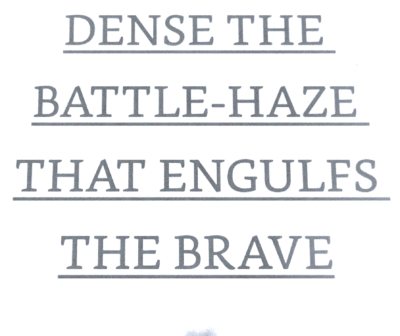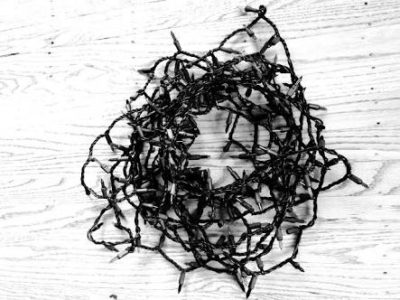Just watched the last episode of season 4 of the Peaky Blinders. Loved it. I hear there will be a season 5, and the show is set up to deal with British politics in the 1920’s . Got me looking around and found this piece – a good bit of background reading.
Back online
I had to do a big thing. The whole of this blog was corrupted. Nothing. With long guides about how to reinstall and reconnect to the database I did it.
I was scared of loosing this. I realise how much I love it when it is gone. Like Christchurch after the earthquake – I was not really home here in Christchurch till now when it is just a mess.
Pleased to see my post about wisdom & consciousness come up. How against the grain that is! I wonder why so may of the people I know who are “idealist in the philosophical sense” don’t dispute my outrageous claims against the received wisdom that is the engine that drives psychotherapy and pretty much all of self help and liberal politics.
Never mind… I’m saying nothing original, just marxism and Moreno stuff that no-one seems to get. I’m curious… is this important? I don’t think liberal tolerance of liberal ideas is a healthy thing. But then it does not really matter… that is the point, reality will win out no matter what stories we tell.
Bear with my reflections…
The ideology does not matter, but being in touch with what reality is up to… that does matter. Who can really figure What is to be done at this time? Wishful thinking wont help much.
~
Anyway, pleased the blog is back
Later, Tuesday, 17 October, 2017
“Men make their own history, but they do not make it as they please; they do not make it under self-selected circumstances, but under circumstances existing already, given and transmitted from the past.”
“It is not the consciousness of men that determines their being, but, on the contrary, their social being that determines their consciousness.”
… every culture is characterized by a certain set of roles which it imposes with a varying degree of success upon its membership.
Moreno Who Shall Survive? p. 88
Two forms of the cultural conserve are referred to in my writings: the technological conserve, as books, motion pictures, robots, and the “human” conserve, the conserve which uses the human organism for its vehicle.
Psychodrama v. 1 p. 123
Pace Layer Thinking : Theory of Change
Pace Layers Thinking: Paul Saffo and Stewart Brand @ The Interval — January 27, 02015
Wonderful podcast. Great exposition of an idea that came through looking at houses and then could be generalised.
The thinking applies to design as well as social change.
The image gives the idea:

~~~
I think of other theories of change:

Needs more explaining but has broad application W = warm-up
~~~
And then there is Dialectics. Not to be dismissed. Hegelian and then Marxist.
Saving Humanity

In July I found this Kim Hill Interview enlightening. Made me see how we have claimed half the earth and now need that other half to sustain us. We must not touch it!
Johan Rockström – planetary boundaries
“Professor Johan Rockström led the team of scientists who worked out the planetary boundaries framework – nine environmental lines we cannot safely cross if human life is to be sustainable on Earth.”
He won the Hillary Award, and is from the Stockholm Resilience Centre
That must be quite a place! It seems another speaker on Kim Hill recently is also connected with the place:
Will Steffen – the beginner’s guide to the Anthropocene
“He says scientists were “staggered” to discover this acceleration was not related to population growth, but to consumption by the world’s wealthiest countries.”
What a great interview. Cuba avoids its carbon production by investing in health and education!
Linking here as I want to listen again.
Wisdom is not Consciousness
Skills, knowledge, spontaneity, intelligence, creativity and wisdom are not consciousness.
Easily and often confused. Consciousness raising, so effective in the 70s brought with it the idea that learning and education developed consciousness. Maybe the miss-use of the word began with Marx? Class consciousness, does he even use that word? If he did he did not mean that it could be developed by reading books or classes alone. Learning comes through experience. Why is using the word consciousness now in the 2010’s a problem?
Hmmm, bear with me… I’m exploring something.
People do not have higher or lower levels of consciousness. People have skills and abilities including the ability to warm up to spontaneity and creativity. People learn things in practice. Experience and relationships build ethical wisdom. Discrimination can be taught. Spontaneity can be trained.
To learn, people need relationships, access to teachers and books and crazy people ( typo) I meant craft people. Being around people who can sing, converse, act, make things, helps people learn. Generous people who share what they know are real teachers.
Action, involvement, engagement, immersion and courage to act and to make mistakes is how people enrich themselves and others. Out of action we get knowledge and ideas. Action first reflection second. Collaboration and interaction before contemplation. All of this makes us wiser.
Wisdom is not consciousness, it is attained through practice and living. Consciousness is a mysterious quality of knowing we are alive and exist. We just know it, but it is a mystery.
Becoming more able, relational, effective and wise is less mysterious, it takes access to good teachers. Courage to act. Willingness to seek advice. Ask questions. Discrimination. Love
_
This is a simple ideal I’m trying to express. Dewey, Marx, Moreno all promoted action learning. Experiential learning. Now more than ever the dominant culture works to keep us passive, ignorant, isolated. Consciousness, higher, lower, altered, psychological, even radical, by any name is individual, private, personal.
~
One of the reasons I’m exploring this line of thinking is that there are plenty of movements that promote the idea that if 10% (or whatever) of people reached some sort of higher state of consciousness then the world would be fixed.
It is more dialectical than that.
We are in process and as the world changes, we change. Action by action. Not only thought by thought.
Wisdom
Snapped that off my Kindle – it is a chapter title half way into Epitaph: A Novel of the O.K. Corral – by Mary Doria Russell – Amazon
I thought, wow that is well worded. Google:
“So on they fought like a swirl of living fire –
You could not say if the sun and moon still stood secure,
So dense the battle-haze that engulfed the brave
Who stood their ground to defend Patroclus’ body.”
Book 17, Illiad
Linking to a Facebook post – Roger awards
https://www.facebook.com/Waltzzz/posts/10154390921772539
Hmm I saved the post then clicked on my saved posts and then again on this one and copied the url.
I might like to have some posts here as I can give them tags! Find them later.
Click the F top right to go to the post. Unfortunately the permanence is entirely up to Facebook. There is no actual data on this page other than the link.
OK — Here it is for as long as I maintain this blog. Copied from the post on Facebook
Going through old documents. Murray Horton kindly sent me a paper newsletter about the Roger awards. So I link to it here, and on my blog, and then I can dispatch with the paper. Interesting – wikipedia needs an update – there was also a 2016 winner – see http://canterbury.cyberplace.org.nz/…/youi-wins-2016-roger-…
https://en.wikipedia.org/wiki/Roger_Award
However this “safe” data will not have any likes or comments. We are in Mark Zuckerberg’s hands.
Invisible threads
http://inthemessy.com/tag/advent/
“We cannot live for ourselves alone. Our lives are connected by a thousand invisible threads, and along these sympathetic fibers, our actions run as causes and return to us as results.”
The space between is invisible – we can only talk about it in metaphor e.g. “broken heart”, “bound together”, “muddy path” and here as “sympathetic fibers”. Not only do we use metaphor, we can use images and symbold – rings, hearts. And in psychodrama we have the simple act of concretisation: place people or objects at a distance to show where they are in your life. Distance becomes visible and conveys meaning.
The quote above from https://www.goodreads.com/author/show/3500800.Henry_Melvill (not the Moby Dick man) seems to be saying that our actions can live after us and multiply. Then come back as karma. And then impact everyone. Be careful what you say and do it can reverberate into the future.
I think of this as Moreno’s sociometric matrix. Sympathetic is a nice word there with its roots in symphony – all the parts of the network working together.
The network of course is a physical metaphor for something unseen, the space.
__________________________________________________
Background
http://melvilliana.blogspot.co.nz/2011/09/finest-thing-herman-melville-never-said.html
__________________________________________________
Lenin used the concept often
https://www.marxists.org/archive/lenin/works/1917/7thconf/24c.htm
All humanity is thrown into a tangled bloody heap from which no nation can extricate itself on its own. Though there are more and less advanced countries, this war has bound them all together by so many threads that escape from this tangle for any single country acting on its own is inconceivable.
Psychological Imperialism
Turns out Trump does not write his books.
In a way it does not detract from the pernicious psychological philosophy that is Trumpism.(I wrote about it here) He does not build his hotels either. And the ghostwriter Tony Schwartz, is now ashamed of his collaboration on the first book “The art of the Deal”. When I saw the list of book titles on Amazon by Tony Schwartz I assumed he was a perpetrator of the same philosophy – GCP – goal centred positivism, or psychological imperialism, or what Marx called idealism, the same standpoint a colleague called “The idolatry of quantitative methods in the teaching of psychiatry”. And I think maybe he was, maybe he still carries the dark seed.
But Tony Schwartz is more complex than just reading the titles suggests. Judging a book by its cover is a bad habit of mine. I still have not read one his books but I have listened to one of his talks on YouTube. It seems he understands one of the hallmarks of the “positive thinking” philosophy, the denial of the “shadow”. He even quotes James Hillman quite well on the need to embrace the shadow (though Hillman could not embrace his own). To accept what is, not just what you desire. He certainly is afraid of a Trump presidency.
Schwartz claims he wrote “The Art of the Deal”. I imagine that what is said in the Guardian is more the case: “In it he translated Trump’s coarse ramblings into charming straight talk”.
I have some hypothesis I’ll continue to investigate.
Schwartz attributes the problem with Trump to his “character”. He is a champion of the philosophy that Trump is a narcissist and a baddie. If he was a goodie then his positivism would be ok.
Trump is a victim at the success end of the American dream. He embodies ideology that is much larger than him, an ideology at the heart of the superstructure of the capitalist system. The rags to riches myth is meant to keep workers in their place, working hard, while they remain poor. Occasionally one of the rich believes the myth, that it is his own character that makes him rich.
Belief in being the biggest, the greatest, the best, the most successful etc. does “work” to some extent. I can imagine the US booming in the most crass and vulgar way, till it crashes and burns and maybe takes the world with it. It is not just Trump, he is the product of a system rotten at the core.
Marx & Comte
The wikipedia page on Comte I just linked to in my last post saw similarities between Marx and Comte.
Not so as revealed in a more careful reading:
He [Comte] was convinced from an early stage that theory had to precede practice and really believed that the social scientists, the generalists trained by his Cours, would provide a blueprint for a perfect society. It is this that led Karl Marx to be so disparaging of Comte’s ideas, who denied ever trying to write “Comtist recipes for the cookshops of the future.” Marx, in contrast, extended the notion of agency to the common people – for him the proletariat – the new class that emerged from the industrial revolution and the establishment of capitalism – were the people with the history making potential for the future. Comte, as we have seen, had a deep distrust of the masses, and thus, while he started out as a proponent of freedom of speech, he ended up proposing a system in which people were told what to think by an intellectual elite. The very idea of Marx’s dictatorship of the proletariat would have been truly terrifying for Comte.
Comte if he were an American today might well have said he could make America great.





